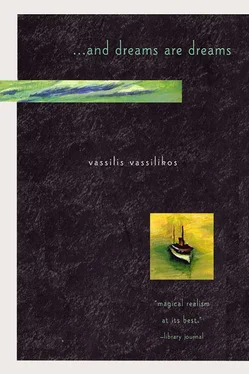And even so, a forty-two-day blockade isn’t such a big deal, compared to other national catastrophes: wars, epidemics, civil strife. Compared to what had preceded and what succeeded it. However, it remains a question in need of an answer.
“The French steamship is expected like a Messiah. Everyone’s eyes are turned to Piraeus and people keep asking: ‘Has the steamship arrived? It will tell us the wishes of France. It will tell us how the action of England was received by Europe. It will tell us whether Palmerston has agreed to the two protective powers being arbitrators.’ One can easily imagine with what wildly beating hearts we are all waiting for the fire vessel from France.”
Because there are fire vessel dreams, and
pyromaniac dreams, and self-igniting dreams, blocks of dreams and dreams of blockades, and Holocaust dreams….
“It was rumored today that Palmerston will only accept the intervention of France. It is an unofficial rumor. What is certain is that Europe took a very dim view of the actions of the English fleet. An article from the French newspaper Debates, sent from Trieste, speaks acrimoniously of England. Notes were exchanged once again between the British ambassador and the Greek government concerning the islands Sapíentza and Elafónissos. But the problem of the islets is insignificant. The important issue is to have satisfaction. The compensation of Don Pacifico is a question of honor, according to the English, and for this I fear there will be terrible consequences. As an impartial spectator, I will await, with tears in my eyes, the fate of our nation.”
The captain of the past is anything but impartial.
It is painful for him, as a neo-Hellene of unknown descent, to accept destiny “in the Greek way.” “If it be destined for this land to be enslaved again and lose its independence, then let us prepare to suffer this ordeal
‘in the Greek way.’”
It was precisely here that the problem was posed, thought the narrator. What did the captain mean by “the Greek way”? This adverbial phrase had acquired a particular significance concerning the man’s feelings.
Would a Frenchman ever say, “we are suffering this new ordeal in the French way”? It was only concerning divorces that the phrase “Italian-style” stuck, and that was because under the Catholic Church they were forbidden. So was it forbidden for one to be a Greek in Greece? Or was Greece simply an idea and not a
reality, in which case, as an idea, “in the Greek way”
takes on the meaning of “in a respectable way”? But what does it mean to be Greek? If we believe Fallmerayer: “The destruction of the ancient Greek world started under the reign of Justinian, when the enormous column of nations between the Danube and the Baltic, shaken by the great historic events, dragged itself over the Greek soil like a dark cloud propelled by a raging storm, and there was not a single valley, mountain or ravine that it did not devastate. The first act of this invasion lasted three centuries. This fact finally sheds light upon why in the Greek Chronicle of the Morea , the mountain range of Taiyetos is preferably referred to as the Slavic Mountains. And the localities of Plátsa, Statsa, Loutsaina, Chloumitsa, Levetsova, Zitsova, Vársova, and Polonitsa attest to these invasions. In act II of the drama all the towns and villages of Greece were persecuted and stripped of their population. A new race of people settled in, into which, every now and then, there slid, like foreigners, the small remnants of the ancient masters of the country. Until, at last, the rejuvenated Byzantine Empire, strengthened by the addition of the vital barbaric power, once again subjugated a Greece that was now Slavic, and, by grafting her with the Christian faith and the modern Greek language, created a completely new Greece.” (He meant in relation to the ancient one.) “Nowadays [1844], the Albanians, ancient neighbors of Greece, constitute the majority of inhabitants of the new kingdom.”
Therefore, concluded the narrator (and
psychoanalysis can take a flying leap), could it be that the words to suffer this ordeal in the Greek way take on a much more complex meaning in the captain’s mind, a meaning that contains all these ordeals, invasions, insults, and deteriorations that the foreigners brought to our country? And the captain of the past cries out the ever-topical slogan of national accord, which is always used during the nation’s difficult moments: “For the sake of our nationality, let us forget for a moment the crimes of the past.”
“And how did the story with Pacifico end,
Grandfather?”
“He was finally given a small compensation, instead of the 800,000 drachmas he had asked for.
Ambassador Wise returned the 150,000 drachmas that the Greek government had given as a guarantee, and the settlement for the Portuguese letters of credit was assigned to Louis Beclar, the French charge d’affaires in Lisbon. The settlement was completed, and instead of the 665,540 drachmas he was claiming, that is to say approximately 26,000, he received as compensation 3,750 drachmas, approximately 150, in other words practically nothing. And in order to whitewash the English, Lyons wrote from Geneva to our compatriot Dragoumis: ‘ I cannot easily forgive him (Lord Palmerston) his decision. For four months Europe was in an upheaval because of Pacifico and a small state was oppressed, a state created, no less, by the oppressor. I too was obliged to protect Pacifico, but I would be ashamed to incite such protection .’ As for Palmerston, he gave a speech at the Council of Communities that went on forever, invoking Cicero, who said that Rome protected any Roman who was able to say, ‘Civis Romanus Sum’ (I am a citizen of Rome). And that, Palmerston affirmed, went for all citizens of the British Empire. He received a standing ovation.”
The captain feels stifled by that longing people have for a happy day in their lives, a decent, carefree day, as the yacht approaches the port of Piraeus and he sees, outside the port, all those ships anchored in bundles of immobilized iron, reduced to inertia, while maintaining them in the water is costing a fortune. He sees the other ships tied at the jetties: Russian, English, French, from Liverpool, from Odessa, from Marseilles, the three great powers. And while his own vessel moves slowly along, with an official air, through the still waters that take on the color of honey from the rising sun, he thinks to himself that things have indeed changed from the days of his distant ancestor. Now he has radar and a telex on board, now he keeps informed, he communicates, he signals immediately and everywhere. And yet the people are still left out of the game of power. They will only find out much later what was said during the meeting between the Soviet ambassador and the prime minister or between the United States ambassador and the president of the Republic. When the burning interest of the same day has died down, when there is no longer an immediate demand, like the one he has to respond to now: he must decide where to moor the boat, and at the same time he is watching out for the Flying Dolphin hovercraft, which usually makes a tight turn at the breakwater without worrying about other vessels coming into the port.
Years from now, when today’s events are history, when the boats will be moored on dry land, much later, people will find out the why and the how: what happened with the Cyprus issue, what was said about the United States bases, what was the truth behind the smoke screen the media put up to confuse people. And of course nowadays, he thinks to himself, “there is no
‘Moussouros affair.’” But still, as they were at the time of Moussouros, our relations with Turkey are severed.
Читать дальше












